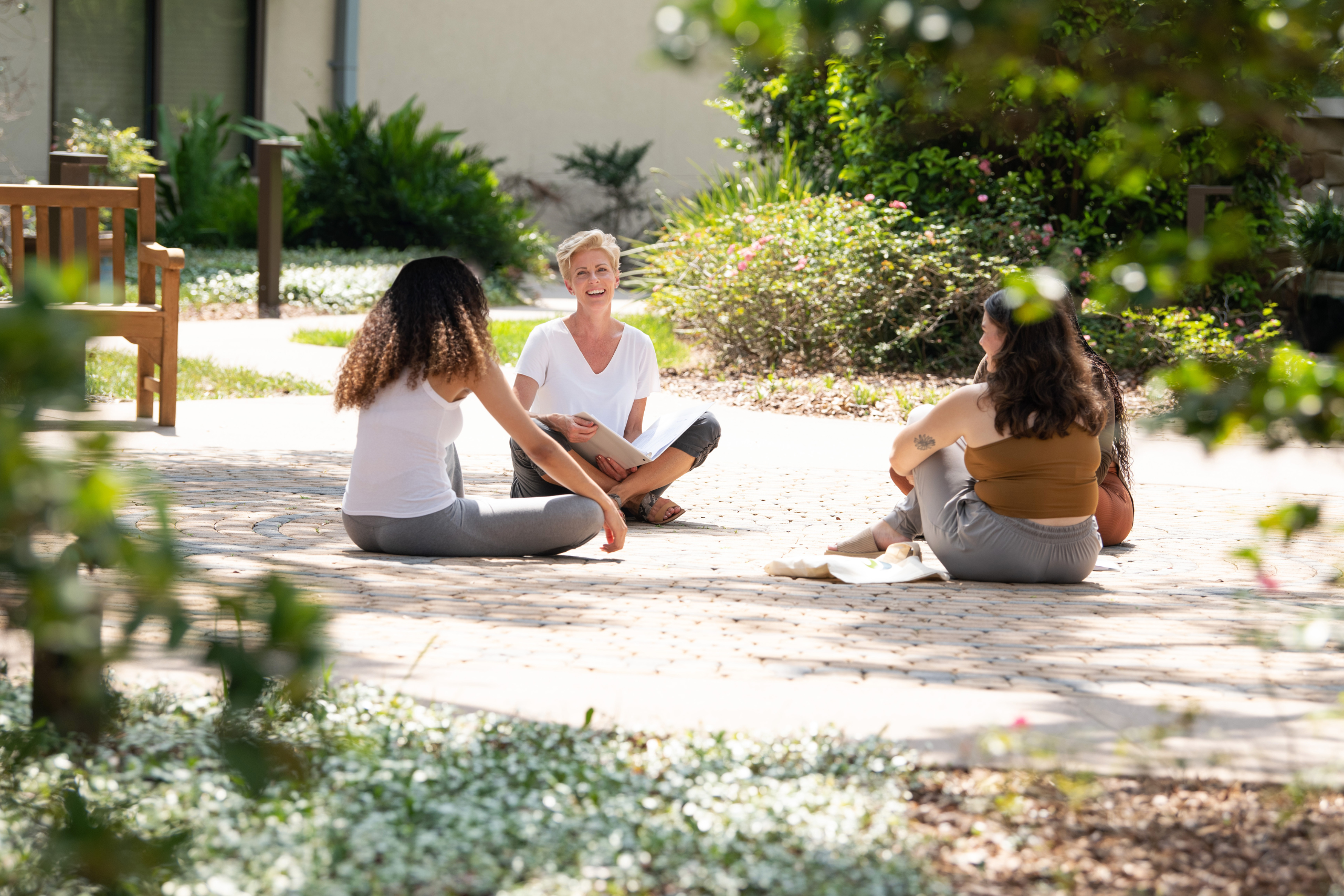When a person comes into residential treatment for their eating disorder (ED), the simple act of eating a meal can be quite stressful. As can preparing a meal in a kitchen, and going out for a meal at a restaurant.
In a minute, I’ll explain how we help our Koru Spring residents in all three of those areas. But first, a general observation about the meal-support process.
When residents arrive at residential care, their food perceptions and eating habits have often been erratic for months or even years. With that experience as their norm, the balanced, consistent, group meals they have in treatment can be anxiety-inducing events. Early on especially, mealtimes don’t feel like safe spaces.
After a while, however, all of that flips. The new habits they learn during meal prep and mealtimes make these occasions feel safe and normal, and the old ways seem increasingly abnormal and stressful to think about. That’s progress!
Here’s how Koru Spring residents accomplish this turnaround in three key areas.
Daily meals
At mealtimes in our dining room, a resident is usually paired with staff. This might be a dietitian, therapist, or other clinician. Often other residents from the resident community are there as well.
Mealtimes are generally calm occasions, very normal, and light-hearted. The key early on is to help the resident restore their nutritional balance so they regain their physical and mental resiliency.
In the state that many people come to us, talk therapy would have little to no effect. That’s why nutrition is the first priority, as it helps build the foundation for therapeutic healing.
During meals, we clinicians do a lot of observing at first. If issues come up during the meal, we talk through them, and try to resolve them on the spot.
Afterwards, we review how things went for the resident. What were the anxious parts, what did the resident struggle with, what was easy, and so on. That information helps us make adjustments and a plan for the next meal.
It’s really important for clinicians to share these meals with our residents. For one thing, we sometimes see things at mealtimes that the residents aren’t aware that they’re doing. That’s important information for their treatment.
This time together during meals is part of what’s great about residential treatment. It gives us the opportunity to really get to know our residents and to see them in real-world situations. In an outpatient setting where you have much less time with patients, that’s just not possible.
Meal preparation
We use an off-site teaching kitchen that we book for our resident visits. This works great for us, as it’s a neutral spot for the residents. We drive to it, so they get a chance to get away from their day-to-day surroundings.
The chefs we work with at the teaching kitchen are trained in the basics of eating disorders, so they are very much a part of our treatment team. They’re a big asset for us.
Before we leave for the kitchen, residents are briefed on who will be going, and what the menu will be. Once there, everything’s organized and broken down into steps. We often play music that matches the cuisine we’re preparing that day.
Newcomers to the program frequently have high expectations for themselves at these meal-prep sessions. They worry they will make mistakes, or won’t prepare food the right way.
We sometimes see two extremes. At one end, there are residents who have done almost no meal preparation before they come to us. They’ve been eating a lot of packaged, processed foods that only require you to open a box or a bag.
At the other end are residents whose preparation process got off track at some point, and they need to re-learn the process. Some got in the habit of taking several hours to prepare for a single meal because of the shopping time it took plus elaborate, over-the-top prepping habits.
We stress that everyone makes mistakes in the kitchen, and we can all learn more.
In the kitchen, residents get exposed to different food tastes and smells, the feel of flour on our hands, the sound of butter or olive oil “popping” in a frying pan, and so on. Along the way, residents learn new cooking techniques. Afterwards, we review how things went, and we brainstorm strategies to try next time.
These meal-prep sessions are meant to bring joy to the cooking process. We have a lot of fun with them.
Going out to eat
This exercise usually comes after residents have become more comfortable with daily meals and meal preparation. There tends to be more unknowns and variables when you go out to eat, so we’re careful about when to do it.
If it’s a resident’s first time out with us, for example, we’ll often aim for a smaller, quieter place like a café, rather than a noisy restaurant. With these exposures, we never want to do more than the resident can handle.
Before heading out, we let residents know who is going to be eating with us and where we’re going. We discuss what triggers we may be dealing with, and prepare for those situations by having a plan in place.
At the restaurant, center staff will guide residents during the food-ordering process if needed, and we’ll often take a minute or two to practice mindfulness before the meal starts. (A few deep breaths can really help ease anxiety.) Then we share the meal.
If issues come up, a therapist is always there to support and guide. If a follow-up discussion is needed back at the treatment center, we try to do that right away if the resident is amenable.
Most of the time, these meals out are super enjoyable.
Final thoughts
The aim of food-related exposures is to improve our residents’ relationship with food. We help them acquire the skills and habits they need so they can take those skills with them when they leave residential treatment.
With all of these situations, we ask the residents to try and keep reasonable expectations. We let them know it’s going to be hard on some days, and that occasionally progress stalls or even reverses itself. That’s okay!
That’s how ED recovery works in general—it isn’t always a straight line. In fact, it’s rarely a straight line. The great news is, with each setback comes a learning opportunity to develop the skills to maintain a strong recovery.




